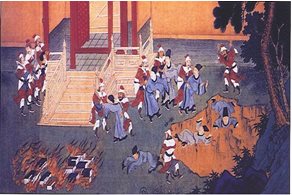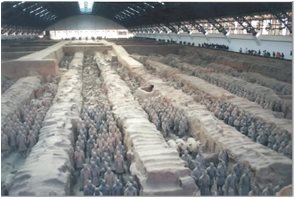The other side
Burning booksLiving three centuries before Qin Shi Huang, the scholar Confucius taught that co-operation, loyalty and doing one’s duty were vital to good relationships, including the relations between Emperor and people. A different philosophy, but one that also encouraged harmony was Taoism. Qin Shi Huang’s Legalist system contrasted dramatically with these philosophies. The ancient painting below gives the historian an idea of what happened to scholars who stayed loyal to the teachings of Confucius.
|
Next lifeThe Chinese beliefs on the afterlife were similar to those of other ancient civilisations in many ways. They believed that the next life was an extension of the one on earth. Thus it was vital that someone was buried with a suitable range of items. Qin Shi Huang hoped to avoid this problem by living forever. He didn’t. Beliefs into practiceIn 1974, three farmers were digging a well near the city of Xi’an in central China. Suddenly, they struck a hard object.
|






